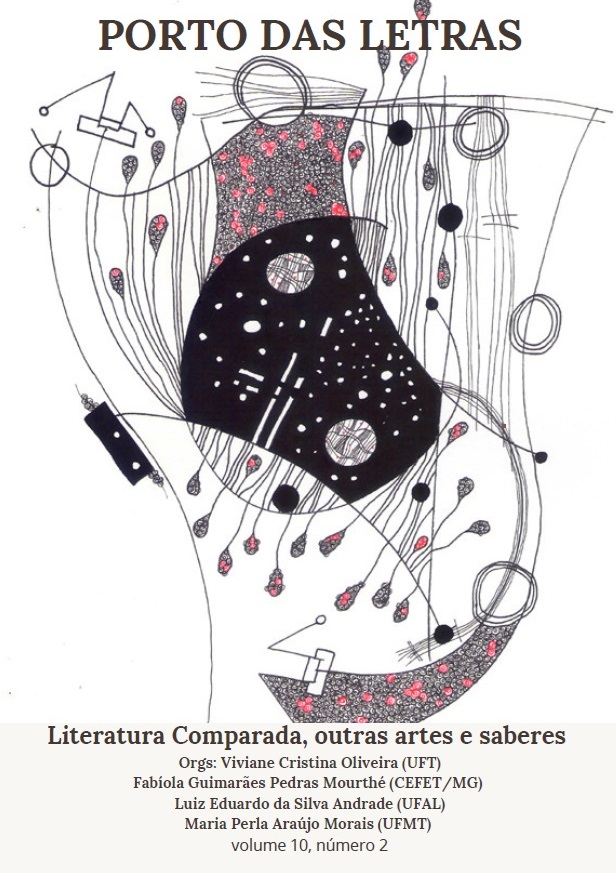A MELANCOLIA DIANTE DO ESPELHO PROVISÓRIO, DE OLGA SAVARY
DOI:
https://doi.org/10.20873.24210Abstract
Olga Savary's poetry, obsessively investigated through the paths of eroticism, will be detailed in this work under the optics of a theme that, it seems, is inseparable from her poetics: Melancholia. The book Espelho Provisório (1970) whispers an unsettling absent presence, and it can be seen that absence is an ostensive character in the book. This research grapples with the hypothesis of the projection of melancholic images in Olga Savary's inaugural work, Provisional Mirror, emphasizing the love presence/absence as one of the predominant themes in the book. The investigation faces the poems “Mito”; “Medusa, um nome mágico (um exorcismo)”; e “Abstrata”, three secretive poems, and aims to identify the eruption of images of Melancholia as one of the lines of force in that work. The apparitions of the spleenetic, sometimes allegorized, sometimes boldly manifesting themes inseparable from black humor, roam throughout the book. Savary's poetry is relentless in its pursuit of an immeasurable range of images that are not exhausted in the saturnine content, but, as this study proposes, it is an undeniable theme, and perhaps the most blatant. In this sense, the imagetic complexity found in only three poems of the book runs into many absences: among them, the absence of an attentive look at the poetry of Olga Savary.
Keywords: Olga Savary; Melancholy; Espelho Provisório; Poetry from Pará.
References
AGAMBEN, Giorgio. Estâncias: a palavras e o fantasma na cultura ocidental. Tradução de Selvino José Assmann. Belo Horizonte: Editora UFMG, 2007.
BENJAMIN, Walter. Sobre alguns temas em Baudelaire. In.: Charles Baudelaire um lírico no auge do capitalismo. Tradução de José Carlos Martins Barbosa e Hemerson Alves Baptista. 3o ed. São Paulo: Brasiliense, 2000. (Obras escolhidas, v. 3).
CALVINO, Ítalo. Seis propostas para o próximo milênio: lições americanas. tradução Ivo Barroso — São Paulo: Companhia das Letras, 1990.
CORDEIRO, M. (2015). Do Efeito ao Paradigma: Narciso, Medusa e Pigmalião. ARS (São Paulo), 13(26), 140-155.
FERRARI, Ilka Franco. Melancolia: de Freud a Lacan, a dor de existir. In.: Latin-American Journal of Fundamental Psychopathology, V. VI, n. 1, maio/2006. (p. 105-115).
FREUD, Sigmund. Luto e melancolia. Tradução de Marilene Carone. São Paulo: Cosac Naify, 2011.
______. Escritores criativos e devaneios. In.: ‘Gradiva’ de Jesen: escritores criativos e devaneios. Rio de janeiro: Imago editora ltda, 1976. (p.100-110).
GINZBURG, Jaime. Literatura, violência e melancolia. Campinas, São Paulo: Autores Associados, 2012.
KERL, Maria Rita. A melancolia em Walter Benjamin e em Freud. In.: Walter Benjamin: experiência histórica e imagens dialéticas. (org.) Carlos Eduardo Jordão Machado; Rubens Machado Jr., Miguel Vedda. São Paulo: editora unesp, 2015. (p. 253-262).
KRISTEVA, Julia. Sol negro. Tradução de Carlota Gomes. 2 ed. Rio de Janeiro: Rocco, 1989.
PAZ, Octavio. A imagem. In.: ______. Signos em Rotação. Trad. Sebastião Uchoa Leite. 3.ed. São Paulo: Perspectiva, 2003
SAVARY, Olga. Repertório selvagem: obra reunida. Rio de Janeiro: MultiMais, 1998.
STAROBINSKI, Jean. A tinta da Melancolia: uma história cultural da tristeza. Tradução de Rosa Freire d'Aguiar. São Paulo: Companhia das letras, 2016.
________. A melancolia diante do espelho: três leituras de Baudelaire. Tradução de Samuel Titan Jr. São Paulo: editora 34, 2014.
SOARES, Angélica. Por uma recriação ecológica do erotismo: flashes da poesia brasileira e portuguesa contemporâneas de autoria feminina. In.: Ipotesi, revista de estudos literários Juiz de Fora, v. 5, n. 2, 2009, (p. 81-97).
Downloads
Published
How to Cite
Issue
Section
License
Os autores concordam com os termos da Declaração de Direito Autoral, que se aplicará a esta submissão caso seja publicada nesta revista (comentários ao editor podem ser incluídos a seguir).

